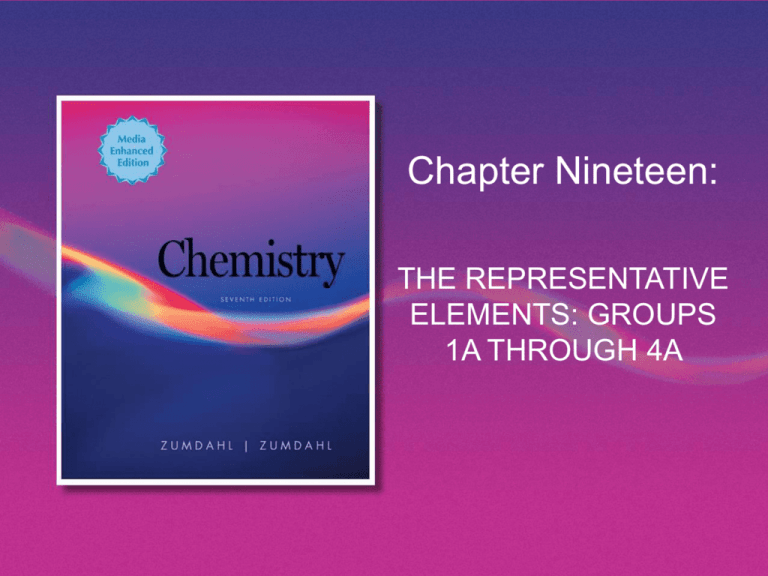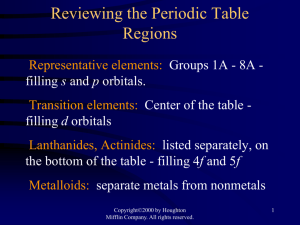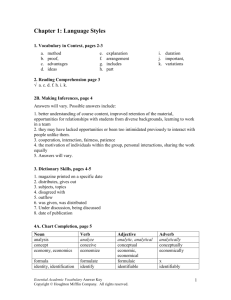
Chapter Nineteen:
THE REPRESENTATIVE
ELEMENTS: GROUPS
1A THROUGH 4A
Reviewing the Periodic Table Regions
• Representative elements:
– Groups 1A - 8A (filling s and p orbitals)
• Transition elements:
– Center of the table (filling d orbitals)
19.1
Chapter 19 | Slide 2
Copyright © Houghton Mifflin Company. All rights reserved.
Reviewing the Periodic Table Regions
• Lanthanides and Actinides:
– Listed separately, on the bottom of the table
(filling 4f and 5f orbitals)
• Metalloids:
– Separate metals from nonmetals
19.1
Chapter 19 | Slide 3
Copyright © Houghton Mifflin Company. All rights reserved.
The Atomic
Radii of Some
Representative
Elements in
Picometers
Chapter 19 | Slide 4
Copyright © Houghton Mifflin Company. All rights reserved.
Alkali Metals (Group 1A): Sources and
Methods of Preparation
19.2
Chapter 19 | Slide 5
Copyright © Houghton Mifflin Company. All rights reserved.
Group 1A Oxides
In the presence of excess oxygen:
4Li + O2
2Na + O2
K + O2
Rb + O2
Cs + O2
2Li2O
Na2O2
KO2
RbO2
CsO2
19.2
Chapter 19 | Slide 6
Copyright © Houghton Mifflin Company. All rights reserved.
Exercise
• Predict the products formed by the following
reactants:
– Na2O2(s) + H2O(l)
– LiH(s) + H2O(l)
19.2
Chapter 19 | Slide 7
Copyright © Houghton Mifflin Company. All rights reserved.
Hydrides
• Binary compounds containing hydrogen:
– Ionic hydrides:
hydrogen + the most active metals
(eg; LiH, CaH2)
– Covalent hydrides:
hydrogen + other nonmetals
(eg; H2O, CH4, NH3)
– Metallic (interstitial) hydrides:
transition metal crystals treated with H2 gas
19.3
Chapter 19 | Slide 8
Copyright © Houghton Mifflin Company. All rights reserved.
Alkaline Earth Metals (Group 2A)
• Very reactive
• Great practical importance:
– Human life (Ca and Mg)
19.4
Chapter 19 | Slide 9
Copyright © Houghton Mifflin Company. All rights reserved.
Ion Exchange
• Ca2+ and Mg2+ are often removed during
ion exchange, releasing Na+ into solution.
• Ion exchange resin – large molecules that
have many ionic sites.
19.4
Chapter 19 | Slide 10
Copyright © Houghton Mifflin Company. All rights reserved.
A Schematic Representation of a
Typical Cation-Exchange Resin
19.4
Chapter 19 | Slide 11
Copyright © Houghton Mifflin Company. All rights reserved.
Inert Pair Effect
• The tendency for the heavier elements of
Groups 3A and 4A to exhibit lower
oxidation states as well as their expected
oxidation states.
• Group 3A
+1 and +3 oxidation states
• Group 4A
+2 and +4 oxidation states
19.5/19.6
Chapter 19 | Slide 12
Copyright © Houghton Mifflin Company. All rights reserved.



